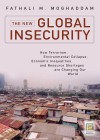The New Global Insecurity: How Terrorism, Environmental Collapse, Economic Inequalities, and Resource Shortages are Changing Our World,
Written by: Fathali M Moghaddam,
Praeger, Santa Barbara, California, 2010,
ISBN 9780313365072
Reviewed by: Michael Lankowski, Strategic Policy Division, Department of Defence
In The New Global Insecurity, Iranian-born psychologist Fatahali M Moghaddam makes an ambitious attempt to explain contemporary global security challenges through a comprehensive theory that identifies subjective individual experiences and threatened collective identities as the primary drivers of global insecurity. The result is a broad-ranging but shallow and uneven study that makes some useful points about the importance of psychological factors in understanding international security, but fails to convincingly demonstrate how its ‘innovative and novel’ alternative to more traditional approaches would improve analysis and policy. Moghaddam admits in the first chapter that human security concepts are frequently seen as ‘vague and woolly’ by traditional security studies scholars. Unfortunately, this book’s weaknesses reinforce rather than challenge that critique.
The book’s starting premise is that globalisation is fostering a ‘profoundly new kind of insecurity’ that traditional realist approaches to security focused on states and military power cannot address. Moghaddam presents a ‘dual-source theory of security’ based on the premise that security perceptions are determined by two sources: individual temperament and early socialisation experiences, and macro-level societal factors that shape adult experiences. His argument about the importance of irrationality or subjective experience in influencing perceptions of security is one the book’s strongest and most coherent themes. There are also useful observations in the book’s definitions of ‘soft and hard security capital’, which emphasise the interdependency between traditional national security and its human security-based ‘enabling conditions’.
However, Moghaddam’s analysis becomes less cogent and focused in Part II as he seeks to describe how psychological factors affect global security in relation to globalisation and identity politics, economic instability, religion, terrorism and torture. Moghaddam makes a series of broad assessments and judgments about why people feel threatened by factors such as economic hardship or changes in a community’s ethno-religious composition, that tend to be unremarkable if not trite. The narrative meanders from topic to topic, without adequately analysing the relative significance of different material or subjective factors or the security perceptions and dilemmas that they generate. Moghaddam is clearly enthusiastic about discussing security perceptions and identity challenges in the Muslim world, their implications for Western societies and the need for better mutual understanding, but there are few observations in the book that have not been made elsewhere.
Moghaddam has previously written on the motivations and structural drivers of terrorism in books such as From the Terrorists’ Point of View, How Globalization Spurs Terrorism and Understanding Terrorism: Psychosocial Roots, Consequences and Interventions. Disappointingly, he appears to have sacrificed clarity and depth of analysis in trying to apply his approach to a holistic study of global security.
The limits and flaws of the book are particularly apparent in Part III, optimistically titled ‘Towards Solutions’. Moghaddam feebly asserts that more efforts need to be made to develop a ‘long-term global diversity policy plan’. He then devotes a chapter to outline a rather banal concept of ‘Omniculturalism’ as a ‘third way’ between assimilation and multiculturalism to managing diversity and overcoming insecurity within societies. This merely underscores the inadequacy of Moghaddam’s ‘comprehensive theory’ of security as a basis for prescriptive analysis that can inform policy responses.
Overall, The New Global Insecurity makes only a limited contribution to the significant body of literature on the broadening of contemporary security studies and the security implications of globalisation. This is not to deny the potential for more useful studies of international security problems using some of the psychologybased concepts advanced by Moghaddam. However, they would achieve much more satisfactory results with the use of a more focused approach.

